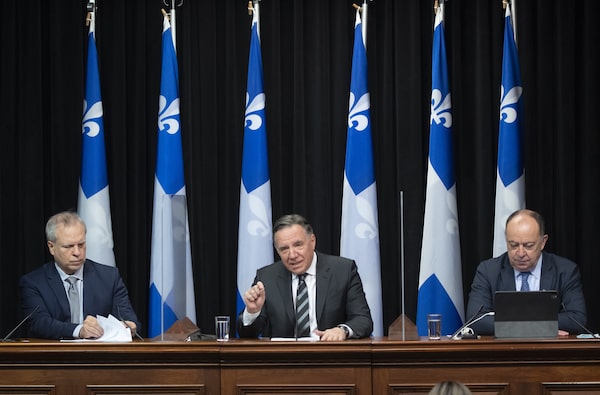
Quebec Premier Francois Legault, centre, speaks during a news conference on the COVID-19 pandemic, Tuesday, February 1, 2022 at the legislature in Quebec City.Jacques Boissinot/The Canadian Press
Quebec Premier François Legault is abandoning the controversial idea of a tax on the unvaccinated that he floated in recent weeks, as he called for “social peace” amid growing unrest around public-health rules.
The tax would have been unique in Canada and raised legal and logistical questions, but Mr. Legault said in mid-January it was necessary to encourage Quebeckers to get vaccinated. At the time, the unvaccinated were dramatically overrepresented among people hospitalized with COVID-19 as the Omicron variant put a massive strain on the province’s health care system.
Now, the Premier said it’s time to “rebuild bridges,” as hospitalizations gradually decline and the province becomes increasingly “fed up” with strict measures.
The move to scrap the tax also comes as his government tries a carrot-and-stick approach to encouraging vaccine uptake, with junior health minister Lionel Carmant leading an outreach effort designed to persuade the skeptical to get their first dose.
“Today, I want to extend a hand to the unvaccinated,” Mr. Legault said.
The Premier said his decision was motivated by a sense that the tax was causing “division,” informed by the angry debates he witnessed on social media, the “freedom convoy” protests in Ottawa and a similar demonstration planned in Quebec City, and resistance from opposition parties.
“I have a certain anxiety seeing the Quebec people divided,” Mr. Legault said. “My role as Premier is to bring Quebeckers together.”
Quebec to impose tax on those who refuse COVID-19 vaccinations
The government in January proposed that a “health contribution” of an unspecified amount be charged to the unvaccinated, possibly through their tax returns. Some European countries, such as Austria and Greece, have imposed or promised similar fines to incentivize vaccination.
Although polls show a majority of Quebeckers supported the policy, many critics said the tax was a step too far in a province where vaccine passports already restrict access to restaurants, bars, theatres and big-box stores, as well as Quebec’s liquor and cannabis retailers.
The Premier may have decided that the policy risked alienating right-wing supporters and fuelling the fledgling Quebec Conservative Party, which has risen in polls recently with an anti-lockdown message, said Daniel Béland, director of the McGill Institute for the Study of Canada.
“I think it was probably a trial balloon,” Prof. Béland said. “This is a government that is kind of centrist and follows the public mood.”
The reversal is the second time Mr. Legault has backtracked on a hardline position about vaccination. In November, he abandoned a promise to require vaccines for health care workers in the face of a severe labour shortage.
In both cases, the threat of punishment apparently had the effect of encouraging some of the target population to get their shots anyway, as the rate of inoculation in the health sector spiked and appointments for first doses rose after the tax announcement. Ninety-two per cent of Quebec adults now have at least one dose.
A government effort to convince the vaccine-hesitant in disadvantaged neighbourhoods with the help of community organizations has also borne fruit, Mr. Legault said on Tuesday. It has led to 11,000 people getting a first shot and 9,000 making an appointment, he said.
But the Premier acknowledged that the decision to abandon a non-vaccination penalty and loosen other restrictions was spurred as much by public attitudes as public-health progress.
“On the one hand we want to protect our hospitals,” he said. “But on the other hand we’re seeing impatience from Quebeckers, who are fed up. I would even say there’s a question of mental health and even of social peace.”
The province is tentatively emerging from a deep lockdown that saw the government impose a roughly two-week 10 p.m. curfew, shutter most public gathering places, and ban indoor gatherings.
Restaurants were allowed to open at half capacity on Monday, while theatres and cinemas can do the same next Monday. As of Feb. 14, indoor adult sports will be allowed again with a maximum of 25 participants and gyms and spas will be allowed to reopen at 50-per-cent capacity.
The number of people hospitalized with COVID-19 declined by more than 400 last week, Mr. Legault said on Tuesday, laying the groundwork for the gradual reopening and the easing of the vaccination policy.
The protests across Canada against public-health measures and the heightened rhetoric on social media were also factors in his decision, Mr. Legault said. As the province emerges from the fifth wave of COVID-19, and after an exhausting two years of pandemic, Quebec needs to improve its “social cohesion,” he said.
“The Québécois people have always been a tight-knit people … I also have a responsibility for people to relearn how to live together.”
Our Morning Update and Evening Update newsletters are written by Globe editors, giving you a concise summary of the day’s most important headlines. Sign up today.
 Eric Andrew-Gee
Eric Andrew-Gee